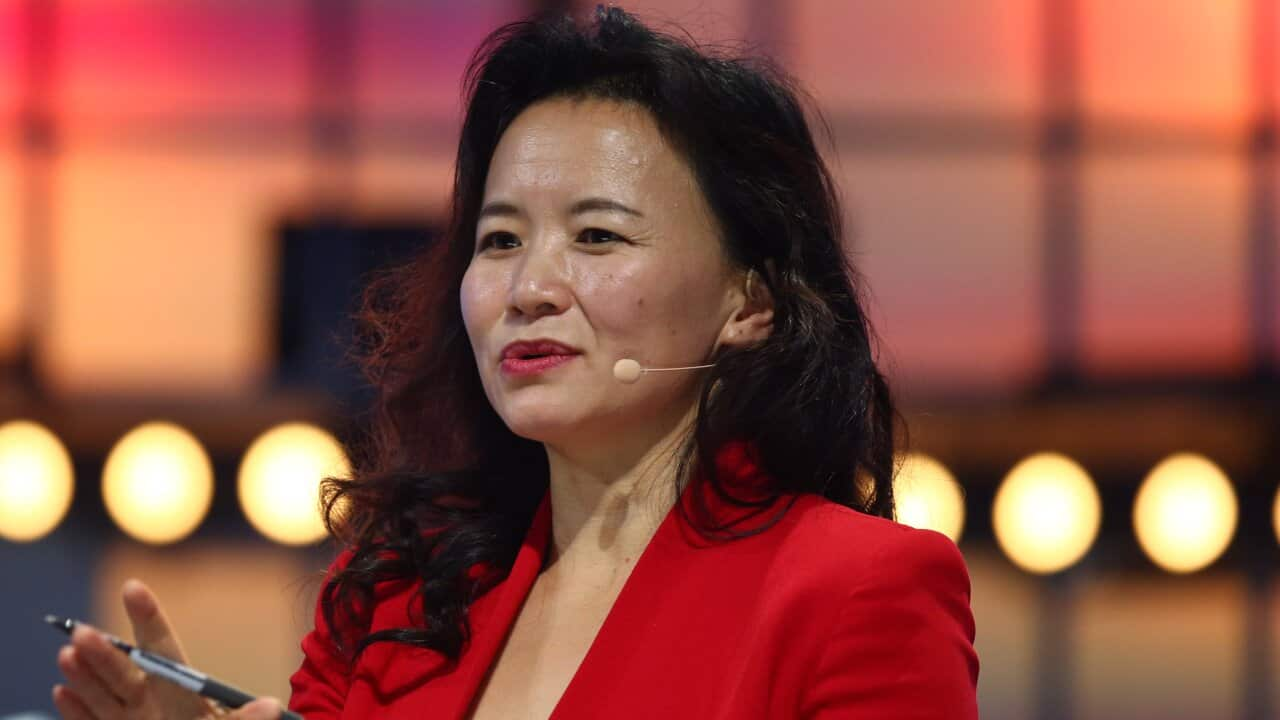The federal government says it will continue to advocate for the release of Australian journalist Cheng Lei, who marks two years in detention in China on Saturday.
Saturday 13 August marks the two-year anniversary of Ms Chen'’s detainment in China. She has faced a closed trial in Beijing on 31 March 2022 and is yet to learn the outcome.
Foreign Minister Penny Wong says the government will continue to advocate for Ms Cheng's interests and wellbeing.
"Our thoughts today are with Ms Cheng's family, including her two young children, with whom she has had no contact since she was detained," she said in a statement.
"Since Ms Cheng was detained in August 2020, the Australian government has consistently called for basic standards of justice, procedural fairness and humane treatment to be met, in accordance with international norms."
Human Rights Watch says the Albanese government should make it clear to its Chinese counterpart that releasing arbitrarily detained Australians is critical to mending the relationships between the two countries.
'Critical to resetting ties' with China
“Two years after her disappearance, and nearly five months after a closed-door trial to which the Australia ambassador was denied entry, Australian journalist Cheng Lei is still languishing in a detention centre in Beijing on dubious state secrets charges,” Yaqiu Wang – Human Rights Watch’s senior China researcher – said in a statement to SBS News on Friday.
“The Albanese government should make it clear that releasing these arbitrarily detained Australians is critical to re-setting the relationship with Beijing,” Ms Yaqiu said.
Her comments came just days after Chinese Ambassador to Australia Xiao Qian addressed the National Press Club in Canberra, where he said Chinese laws must be “respected”.
“I think we all have to respect the laws and regulations of China,” Mr Xiao said on Wednesday.
Here’s a brief recap of the events of the past two years.
What happened?
Exactly two years ago to this day, Ms Cheng was taken into detention in Beijing for allegedly leaking state secrets.
An Australian citizen, Ms Cheng, 47, was born in China and was working as a TV anchor for Chinese state-controlled English broadcaster CGTN.
The mother of two was critical of the Chinese government on her social media platforms prior to her being detained.
The Chinese government didn’t link Ms Cheng’s detention to her social media posts nor did they reveal any further details about the case.
Soon after Ms Cheng was moved into detention, CGTN removed all evidence of her employment with the broadcaster from its website and social media channels.
Within weeks of Ms Cheng being detained, Zhao Lijian – deputy director of the Chinese Ministry of Foreign Affairs Information Department – confirmed in a press conference Ms Cheng was “suspected of carrying out illegal activities endangering China’s national security”.
“This case is being handled according to law and Cheng’s legitimate rights and interests are fully guaranteed,” he said.
The court case
In February 2021, the detained Australian citizen was formally arrested and in March this year a closed-door trial kicked off in a Beijing court.
Australia’s Ambassador to China, Graham Fletcher, was among the foreign diplomats and journalists who were barred from entering the courtroom as Ms Cheng faced trial.

Australian Ambassador to China Graham Fletcher (centre) leaves a court after he was denied entry onto the premises for the trial of Australian journalist Cheng Lei in Beijing on 31 March. Source: AFP / Noel Celis / Getty Images
“The Australian government respects the sovereignty of China’s legal system. However, Ms Cheng’s case has lacked transparency and the Australian government has never been provided with details of the charges,” she said.
Mr Xiao – Chinese Ambassador to Australia – on Wednesday confirmed Ms Cheng’s case was “still in the process”.
Personal impact
, Ms Cheng’s partner Nick Coyle opened up about the challenges he and her two school-age children have faced over the past two years.
“She hasn’t had the opportunity to speak to her family or children or me or anyone in that 23 months and counting,” Mr Coyle told SBS News.
During her detention, Ms Cheng was allowed face-to-face meetings with Australian consular officials, but even they were abandoned during the COVID-19 lockdowns.
“She has her 30-minute, once-a-month consular visit done via video call,” Mr Coyle said.
Ms Yaqiu of Human Rights Watch is critical of how Ms Cheng is being treated in China.
“Cheng has been denied consistent access to visits by consular officials or family. It was also recently reported that she is not being provided with adequate food,” Ms Yaqiu said.
Who else has been arbitrarily detained in China?
Ms Cheng is not the only Australian wrongfully detained, Ms Yaqiu said.
“Writer Yang Hengjun has now been held for more than three years,” she said.
A former Chinese diplomat, a novelist and blogger, pro-democracy advocate Mr Yang flew into Guangzhou with his wife and child in January 2019.
While his family was allowed to enter the country, Mr Yang was detained on espionage charges and hasn’t been released since.
The 55-year-old faced trial in May this year.
[These cases lay] bare the abusive, impervious and politicised nature of China’s justice system.Yaqiu Wang, Human Rights Watch’s senior China researcher
Mr Xiao – Chinese Ambassador to Australia – confirmed on Wednesday Mr Yang’s case is also “still under jurisdiction process and we want to sort it out according to Chinese rule and the laws”.
“There are a couple of Australian citizens in China that are under custody according to Chinese rules and laws, and their basic rights are well protected, don’t worry about that,” he said.
But Human Rights Watch’s Ms Yaqiu is not convinced with his statement.
“[These cases] make a mockery of Chinese ambassador Xiao Qian’s claim this week that Cheng’s ‘basic rights are well protected’, and [lay] bare the abusive, impervious and politicised nature of China’s justice system,” Ms Yaqiu said.
SBS News has contacted the office of Foreign Affairs Minister Penny Wong for comment.











